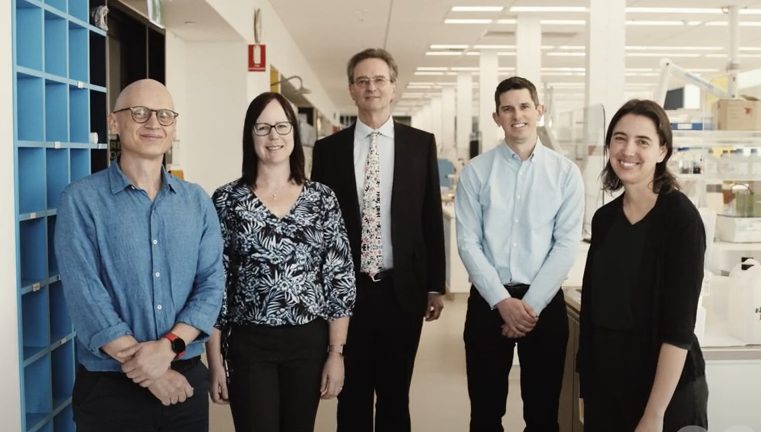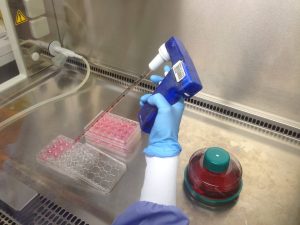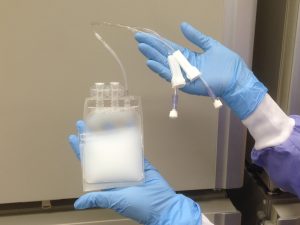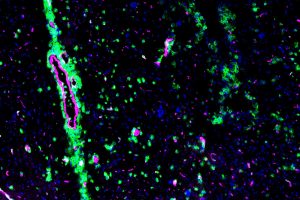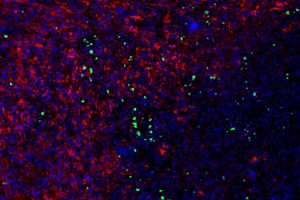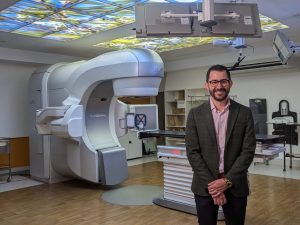Making progress on treatments for deadly cancers requires years of commitment, innovation and funding.
Professor Michael Brown and Dr Tessa Gargett from Central Adelaide Local Health Network (CALHN) report two promising outcomes related to their team’s work developing new therapies for hard-to-treat cancers.
Professor Brown has been awarded £150,000 (AU$285,000) over two years from The Brain Tumour Charity UK to fund research targeting glioblastoma, an aggressive brain cancer.
Dr Gargett is lead author on a paper describing advances in a related therapy for patients with advanced cancers of the skin, bowel, and soft tissues.
The therapies are cutting edge, and involve applying the science of the immune system to kill cancer cells.
Beating brain cancer
Diagnosis with glioblastoma is grim. This type of brain cancer does not respond well to existing treatments, and its biological features prevent the affected person’s immune system from killing tumour cells.
“Current treatments for glioblastoma are ineffective, and this situation has not improved in almost 20 years,” says Professor Brown.
“We aspire to develop new therapies that go beyond traditional cancer treatment approaches.”
“Two international teams are coming together for this project in a new collaboration.”
Working with researchers in Cambridge, England, and local collaborators, Professor Brown’s work will focus on amplifying the patient immune response against glioblastoma cells, applying a type of cell called a CAR-T cell and an immune molecule known as interleukin-2, or IL-2.
In early laboratory studies, the research teams found that IL-2 can boost the effectiveness of CAR-T cell therapy against glioblastoma cells.
- CAR-T cells are grown under sterile conditions in the laboratory.
- CAR-T cells formulated and ready for patient infusion.
Assessing CAR-T cells in a clinical trial
In addition to brain cancer, CAR-T cells hold promise as a therapy for solid tumours of the skin, bowel, and other tissues.
Along with U.S.-based colleagues, Dr Gargett and Professor Brown have developed CAR-T cells that target a molecule known as GD2, found on many types of cancer cells. The researchers think CAR-T cells targeting GD2 could boost patient immune systems and kill cancers.
“Our latest paper is the first report of GD2-CAR-T cell therapy in patients with metastatic colorectal cancer, and patients with advanced melanoma,” Dr Gargett says.
Metastatic colorectal cancer refers to cancer that has spread from the large intestine or rectum. Melanoma is a type of skin cancer, and is advanced when it has spread to lymph nodes or other parts of the body.
“Our results show we’re able to successfully prepare GD2-CAR-T cells for administration to patients with GD2-positive solid tumours, and the procedure is safe,” says Dr Gargett.
“Targeting of GD2 remains an active and promising CAR-T cell therapy for multiple types of tumour.”
Using what they’ve learned from this clinical trial, the team has now advanced to further trials of GD2-CAR-T cells in patients with primary brain cancers.
- Microscopic image shows CAR-T cells (green) entering the brain tumour via blood vessels (purple).
- Microscopic image of CAR-T cells (green) spreading out to fight brain tumour cells (red).
Award-winning research
Professor Michael Brown is Head of Translational Oncology at the Centre for Cancer Biology, a Senior Consultant Medical Oncologist at Royal Adelaide Hospital (RAH), and the Director of the RAH Cancer Clinical Trials Unit.
Dr Tessa Gargett is an immunologist and cell therapy specialist working at the Centre for Cancer Biology, University of South Australia, and the RAH.
Professor Brown, Dr Gargett and the broader team were awarded the 2023 Premier’s Excellence Award Driving Innovation – Team, and selected as finalist in the 2023 SA Science Excellence and Innovation Awards.
Read the research
More information on the Expanding Theories funding for Professor Brown’s research is available on the The Brain Tumour Charity’s website. The project is titled Using brain-derived and micro-targeted interleukin-2 to boost CAR-T cell therapy for aggressive primary brain tumours.
Dr Gargett’s new paper was published in the Journal for ImmunoTherapy of Cancer, a specialised publication from the British Medical Journal. It is freely available for all readers: Safety and biological outcomes following a phase 1 trial of GD2-specific CAR-T cells in patients with GD2-positive metastatic melanoma and other solid cancers.
